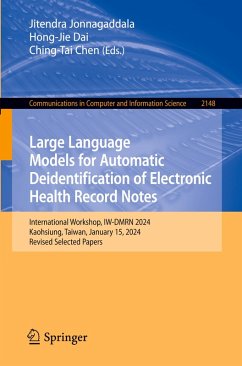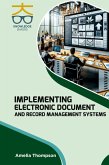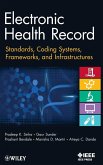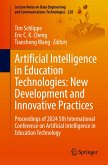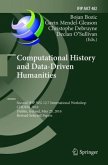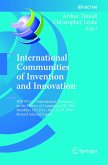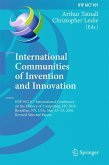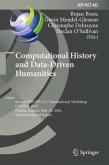Large Language Models for Automatic Deidentification of Electronic Health Record Notes
International Workshop, IW-DMRN 2024, Kaohsiung, Taiwan, January 15, 2024, Revised Selected Papers
Herausgegeben:Jonnagaddala, Jitendra; Dai, Hong-Jie; Chen, Ching-Tai
Large Language Models for Automatic Deidentification of Electronic Health Record Notes
International Workshop, IW-DMRN 2024, Kaohsiung, Taiwan, January 15, 2024, Revised Selected Papers
Herausgegeben:Jonnagaddala, Jitendra; Dai, Hong-Jie; Chen, Ching-Tai
- Broschiertes Buch
- Merkliste
- Auf die Merkliste
- Bewerten Bewerten
- Teilen
- Produkt teilen
- Produkterinnerung
- Produkterinnerung
This volume constitutes the refereed proceedings of the International Workshop on Deidentification of Electronic Health Record Notes, IW-DMRN 2024, held on January 15, 2024, in Kaohsiung, Taiwan.
The 15 full papers were carefully reviewed and selected from 30 submissions. The conference focuses on medical data analysis, enhancing medication safety, and optimizing medical care efficiency.
Andere Kunden interessierten sich auch für
![Implementing Electronic Document and Record Management Systems Implementing Electronic Document and Record Management Systems]() Amelia ThompsonImplementing Electronic Document and Record Management Systems70,99 €
Amelia ThompsonImplementing Electronic Document and Record Management Systems70,99 €![Electronic Health Record Electronic Health Record]() Pradeep K. SinhaElectronic Health Record109,99 €
Pradeep K. SinhaElectronic Health Record109,99 €![Artificial Intelligence in Education Technologies: New Development and Innovative Practices Artificial Intelligence in Education Technologies: New Development and Innovative Practices]() Artificial Intelligence in Education Technologies: New Development and Innovative Practices90,99 €
Artificial Intelligence in Education Technologies: New Development and Innovative Practices90,99 €![Computational History and Data-Driven Humanities Computational History and Data-Driven Humanities]() Computational History and Data-Driven Humanities38,99 €
Computational History and Data-Driven Humanities38,99 €![International Communities of Invention and Innovation International Communities of Invention and Innovation]() International Communities of Invention and Innovation38,99 €
International Communities of Invention and Innovation38,99 €![International Communities of Invention and Innovation International Communities of Invention and Innovation]() International Communities of Invention and Innovation38,99 €
International Communities of Invention and Innovation38,99 €![Computational History and Data-Driven Humanities Computational History and Data-Driven Humanities]() Computational History and Data-Driven Humanities38,99 €
Computational History and Data-Driven Humanities38,99 €-
-
-
This volume constitutes the refereed proceedings of the International Workshop on Deidentification of Electronic Health Record Notes, IW-DMRN 2024, held on January 15, 2024, in Kaohsiung, Taiwan.
The 15 full papers were carefully reviewed and selected from 30 submissions. The conference focuses on medical data analysis, enhancing medication safety, and optimizing medical care efficiency.
The 15 full papers were carefully reviewed and selected from 30 submissions. The conference focuses on medical data analysis, enhancing medication safety, and optimizing medical care efficiency.
Produktdetails
- Produktdetails
- Communications in Computer and Information Science 2148
- Verlag: Springer / Springer Nature Singapore / Springer, Berlin
- Artikelnr. des Verlages: 978-981-97-7965-9
- Seitenzahl: 228
- Erscheinungstermin: 26. Januar 2025
- Englisch
- Abmessung: 235mm x 155mm x 13mm
- Gewicht: 353g
- ISBN-13: 9789819779659
- ISBN-10: 9819779650
- Artikelnr.: 71466965
- Herstellerkennzeichnung
- Springer-Verlag GmbH
- Tiergartenstr. 17
- 69121 Heidelberg
- ProductSafety@springernature.com
- Communications in Computer and Information Science 2148
- Verlag: Springer / Springer Nature Singapore / Springer, Berlin
- Artikelnr. des Verlages: 978-981-97-7965-9
- Seitenzahl: 228
- Erscheinungstermin: 26. Januar 2025
- Englisch
- Abmessung: 235mm x 155mm x 13mm
- Gewicht: 353g
- ISBN-13: 9789819779659
- ISBN-10: 9819779650
- Artikelnr.: 71466965
- Herstellerkennzeichnung
- Springer-Verlag GmbH
- Tiergartenstr. 17
- 69121 Heidelberg
- ProductSafety@springernature.com
.- Deidentification And Temporal Normalization of The Electronic Health Record Notes Using Large Language Models: The 2023 SREDH/AI-Cup Competition for Deidentification of Sensitive Health Information.
.- Enhancing Automated De-identification of PathologyText Notes Using Pre-Trained Language Models.
.- A Comparative Study of GPT3.5 Fine Tuning and Rule-Based Approaches for De-identification and Normalization of Sensitive Health Information in Electronic Medical Record Notes.
.- Advancing Sensitive Health Data Recognition and Normalization through Large Language Model Driven Data Augmentation.
.- Privacy Protection and Standardization of Electronic Medical Records Using Large Language Model.
.- Applying Language Models for Recognizing and Normalizing Sensitive Information from Electronic Health Records Text Notes.
.- Enhancing SHI Extraction and Time Normalization in Healthcare Records Using LLMs and Dual- Model Voting.
.- Evaluation of OpenDeID Pipeline in the 2023 SREDH/AI-Cup Competition for Deidentification of Sensitive Health Information.
.- Sensitive Health Information Extraction from EMR Text Notes: A Rule-Based NER Approach Using Linguistic Contextual Analysis.
.- A Hybrid Approach to the Recognition of Sensitive Health Information: LLM and Regular Expressions.
.- Patient Privacy Information Retrieval with Longformer and CRF, Followed by Rule-Based Time Information Normalization: A Dual-Approach Study.
.- A Deep Dive into the Application of Pythia for Enhancing Medical Information De-identification in the AI CUP 2023.
.- Utilizing Large Language Models for Privacy Protection and Advancing Medical Digitization.
.- Comprehensive Evaluation of Pythia Model Efficiency in De-identification and Normalization for Enhanced Medical Data Management.
.- A Two-stage Fine-tuning Procedure to Improve the Performance of Language Models in Sensitive Health Information Recognition and Normalization Tasks.
.- Enhancing Automated De-identification of PathologyText Notes Using Pre-Trained Language Models.
.- A Comparative Study of GPT3.5 Fine Tuning and Rule-Based Approaches for De-identification and Normalization of Sensitive Health Information in Electronic Medical Record Notes.
.- Advancing Sensitive Health Data Recognition and Normalization through Large Language Model Driven Data Augmentation.
.- Privacy Protection and Standardization of Electronic Medical Records Using Large Language Model.
.- Applying Language Models for Recognizing and Normalizing Sensitive Information from Electronic Health Records Text Notes.
.- Enhancing SHI Extraction and Time Normalization in Healthcare Records Using LLMs and Dual- Model Voting.
.- Evaluation of OpenDeID Pipeline in the 2023 SREDH/AI-Cup Competition for Deidentification of Sensitive Health Information.
.- Sensitive Health Information Extraction from EMR Text Notes: A Rule-Based NER Approach Using Linguistic Contextual Analysis.
.- A Hybrid Approach to the Recognition of Sensitive Health Information: LLM and Regular Expressions.
.- Patient Privacy Information Retrieval with Longformer and CRF, Followed by Rule-Based Time Information Normalization: A Dual-Approach Study.
.- A Deep Dive into the Application of Pythia for Enhancing Medical Information De-identification in the AI CUP 2023.
.- Utilizing Large Language Models for Privacy Protection and Advancing Medical Digitization.
.- Comprehensive Evaluation of Pythia Model Efficiency in De-identification and Normalization for Enhanced Medical Data Management.
.- A Two-stage Fine-tuning Procedure to Improve the Performance of Language Models in Sensitive Health Information Recognition and Normalization Tasks.
.- Deidentification And Temporal Normalization of The Electronic Health Record Notes Using Large Language Models: The 2023 SREDH/AI-Cup Competition for Deidentification of Sensitive Health Information.
.- Enhancing Automated De-identification of PathologyText Notes Using Pre-Trained Language Models.
.- A Comparative Study of GPT3.5 Fine Tuning and Rule-Based Approaches for De-identification and Normalization of Sensitive Health Information in Electronic Medical Record Notes.
.- Advancing Sensitive Health Data Recognition and Normalization through Large Language Model Driven Data Augmentation.
.- Privacy Protection and Standardization of Electronic Medical Records Using Large Language Model.
.- Applying Language Models for Recognizing and Normalizing Sensitive Information from Electronic Health Records Text Notes.
.- Enhancing SHI Extraction and Time Normalization in Healthcare Records Using LLMs and Dual- Model Voting.
.- Evaluation of OpenDeID Pipeline in the 2023 SREDH/AI-Cup Competition for Deidentification of Sensitive Health Information.
.- Sensitive Health Information Extraction from EMR Text Notes: A Rule-Based NER Approach Using Linguistic Contextual Analysis.
.- A Hybrid Approach to the Recognition of Sensitive Health Information: LLM and Regular Expressions.
.- Patient Privacy Information Retrieval with Longformer and CRF, Followed by Rule-Based Time Information Normalization: A Dual-Approach Study.
.- A Deep Dive into the Application of Pythia for Enhancing Medical Information De-identification in the AI CUP 2023.
.- Utilizing Large Language Models for Privacy Protection and Advancing Medical Digitization.
.- Comprehensive Evaluation of Pythia Model Efficiency in De-identification and Normalization for Enhanced Medical Data Management.
.- A Two-stage Fine-tuning Procedure to Improve the Performance of Language Models in Sensitive Health Information Recognition and Normalization Tasks.
.- Enhancing Automated De-identification of PathologyText Notes Using Pre-Trained Language Models.
.- A Comparative Study of GPT3.5 Fine Tuning and Rule-Based Approaches for De-identification and Normalization of Sensitive Health Information in Electronic Medical Record Notes.
.- Advancing Sensitive Health Data Recognition and Normalization through Large Language Model Driven Data Augmentation.
.- Privacy Protection and Standardization of Electronic Medical Records Using Large Language Model.
.- Applying Language Models for Recognizing and Normalizing Sensitive Information from Electronic Health Records Text Notes.
.- Enhancing SHI Extraction and Time Normalization in Healthcare Records Using LLMs and Dual- Model Voting.
.- Evaluation of OpenDeID Pipeline in the 2023 SREDH/AI-Cup Competition for Deidentification of Sensitive Health Information.
.- Sensitive Health Information Extraction from EMR Text Notes: A Rule-Based NER Approach Using Linguistic Contextual Analysis.
.- A Hybrid Approach to the Recognition of Sensitive Health Information: LLM and Regular Expressions.
.- Patient Privacy Information Retrieval with Longformer and CRF, Followed by Rule-Based Time Information Normalization: A Dual-Approach Study.
.- A Deep Dive into the Application of Pythia for Enhancing Medical Information De-identification in the AI CUP 2023.
.- Utilizing Large Language Models for Privacy Protection and Advancing Medical Digitization.
.- Comprehensive Evaluation of Pythia Model Efficiency in De-identification and Normalization for Enhanced Medical Data Management.
.- A Two-stage Fine-tuning Procedure to Improve the Performance of Language Models in Sensitive Health Information Recognition and Normalization Tasks.

